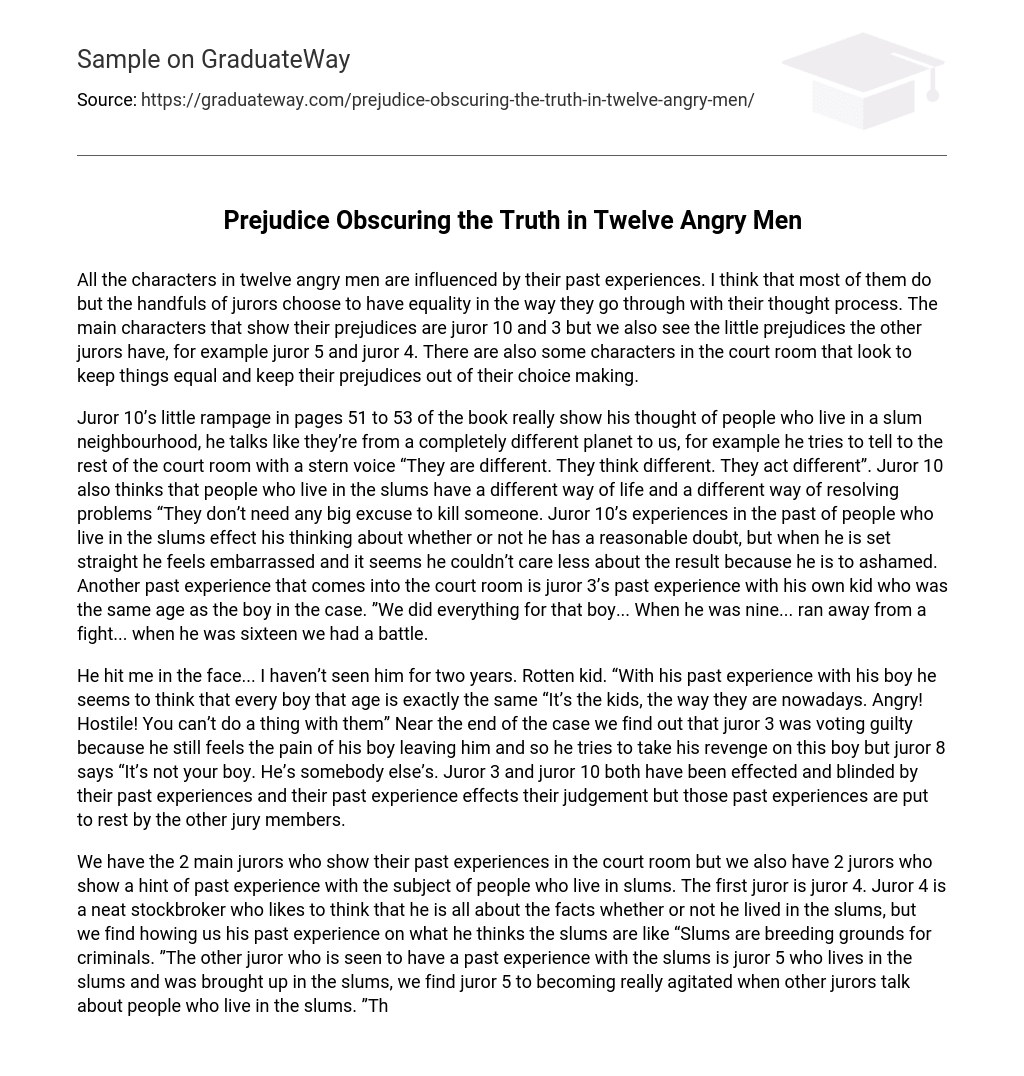In twelve angry men, all the characters are shaped by their previous experiences, but only a select few jurors strive for fairness in their decision-making process. Jurors 10 and 3 exhibit strong biases, while jurors 5 and 4 also display some subtle prejudices. However, there are also individuals in the courtroom who aim to maintain impartiality and refrain from letting their biases affect their choices.
Juror 10’s tirade on pages 51 to 53 exhibits his perception of people living in a slum neighborhood, as he speaks as though they hail from a completely distinct realm. For instance, he attempts to declare to the rest of the courtroom in a stern tone, “They are different. They think different. They act different.” Additionally, Juror 10 believes that slum dwellers possess a divergent lifestyle and approach to problem-solving, stating, “They don’t need any big excuse to kill someone.” Juror 10’s prior experiences with residents of slums impact his deliberation on whether he has reasonable doubt, but when corrected, he feels ashamed and appears disinterested in the outcome. Another past experience that becomes relevant in the courtroom is Juror 3’s encounter with his own child who was the same age as the defendant in the case. “We did everything for that boy… When he was nine… ran away from a fight… when he was sixteen we had a battle.”
He hit me in the face… I haven’t seen him for two years. Rotten kid. “With his past experience with his boy, he seems to think that every boy that age is exactly the same. It’s the kids, the way they are nowadays. Angry! Hostile! You can’t do a thing with them.” Near the end of the case, we find out that juror 3 was voting guilty because he still feels the pain of his boy leaving him. So, he tries to take his revenge on this boy. But juror 8 says, “It’s not your boy. He’s somebody else’s.” Juror 3 and juror 10 have both been affected and blinded by their past experiences. Their past experience affects their judgment. But those past experiences are put to rest by the other jury members.
We have two main jurors who demonstrate their past experiences in the courtroom, while there are also two jurors who indicate their familiarity with individuals living in slums. The first juror, juror 4, is a tidy stockbroker who believes himself to be focused on the facts, regardless of whether or not he has lived in slums. However, he reveals his past experience by stating, “Slums are breeding grounds for criminals.” Another juror who exhibits familiarity with slums is juror 5, who resides in and was raised in a slum. We notice that juror 5 becomes highly agitated when other jurors discuss people living in slums. “The 5th Juror goes into the wash-room, slams the door behind him.” These stage directions occur when juror 10 goes on a rant about these individuals reproducing and suggests that we should seize the opportunity to kill one.
In the courtroom, not only do we see people presenting their previous experiences, but we also have a juror who values equality and strives to enforce it. Juror 11, a watchmaker from Europe, defends the accused because others believe that individuals from impoverished areas are more likely to commit murder. He argues, “Suggesting that someone is capable of murder does not necessarily mean they are guilty,” emphasizing how prejudice hinders truth regardless of its origins. Within the courtroom, we witness Juror 10’s past encounters with individuals from the slums shaping his perceptions, while Juror 3’s personal history with his son influences his desire for retribution.
Juror 5’s previous encounter and understanding of individuals from impoverished areas, coupled with his own background in such an environment, potentially shaped his decision-making due to possible bias. Juror 4, despite his reliance on logical analysis, reveals a preexisting perception regarding slums. Furthermore, certain individuals within the courtroom endeavor to assist the defendant and level the playing field, aiming to prevent other jurors from being unduly influenced by their past encounters. While I partially agree that the characters in Twelve Angry Men are influenced by their past experiences, I also hold some reservations regarding this assertion.





